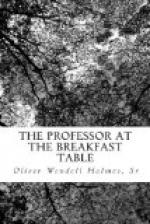There is something in that,—said I.—Only I rather think life can coin thought somewhat faster than I can count it off in words. What if one shall go round and dry up with soft napkins all the dew that falls of a June evening on the leaves of his garden? Shall there be no more dew on those leaves thereafter? Marry, yea,—many drops, large and round and full of moonlight as those thou shalt have absterged!
Here am I, the Professor,—a man who has lived long enough to have plucked the flowers of life and come to the berries,—which are not always sad-colored, but sometimes golden-hued as the crocus of April, or rosy-cheeked as the damask of June; a man who staggered against books as a baby, and will totter against them, if he lives to decrepitude; with a brain full of tingling thoughts, such as they are, as a limb which we call “asleep,” because it is so particularly awake, is of pricking points; presenting a key-board of nerve-pulps, not as yet tanned or ossified, to finger-touch of all outward agencies; knowing nothing of the filmy threads of this web of life in which we insects buzz awhile, waiting for the gray old spider to come along; contented enough with daily realities, but twirling on his finger the key of a private Bedlam of ideals; in knowledge feeding with the fox oftener than with the stork,—loving better the breadth of a fertilizing inundation than the depth of narrow artesian well; finding nothing too small for his contemplation in the markings of the grammatophora subtilissima, and nothing too large in the movement of the solar system towards the star Lambda of the constellation Hercules;—and the question is, whether there is anything left for me, the Professor, to suck out of creation, after my lively friend has had his straw in the bung-hole of the Universe!
A man’s mental reactions with the atmosphere of life must go on, whether he will or no, as between his blood and the air he breathes. As to catching the residuum of the process, or what we call thought,—the gaseous ashes of burned-out thinking,—the excretion of mental respiration,—that will depend on many things, as, on having a favorable intellectual temperature about one, and a fitting receptacle.—I sow more thought-seeds in twenty-four hours’ travel over the desert-sand along which my lonely consciousness paces day and night, than I shall throw into soil where it will germinate, in a year. All sorts of bodily and mental perturbations come between us and the due projection of our thought. The pulse-like “fits of easy and difficult transmission” seem to reach even the transparent medium through which our souls are seen. We know our humanity by its often intercepted rays, as we tell a revolving light from a star or meteor by its constantly recurring obscuration.




